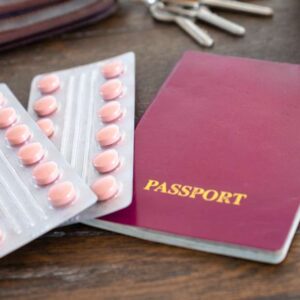
WARNING—Your Water Bottle Is Hiding a Disgusting Secret
Recently, a few people have asked me if it’s true that their water bottle has more germs than a toilet seat.
It’s a shocking comparison that’ll make you think twice about everyday objects you use without much thought.
So, is this claim true?
Well, I must warn you that you might not like the answer…
It’s true.
As uncomfortable as it is to think about, your reusable water bottle may be crawling with germs.
Studies show that popular reusable water bottles can harbor a significant number of bacteria—in fact, they could be 40,000 times dirtier than a toilet seat!
If you think that seems impossible since you only ever carry water in it, you’re not alone. Most folks are shocked to discover how dirty their water bottle could be.
So, what’s going on here?
It comes down to a few key factors:
First, toilet seats are usually cleaned regularly with disinfectants designed to kill bacteria. Meanwhile, your water bottle often goes days or weeks without a proper cleaning.
Second, our mouths are full of bacteria, which transfer to the bottle each time we take a sip. Add the warm, moist environment inside the bottle, and you’ve created the perfect breeding ground for microorganisms.
Third, we constantly touch our water bottles with our hands, which pick up germs from everything else we touch.
But before you toss your reusable bottle in the trash, you should know that this doesn’t necessarily mean your water bottle is going to make you sick. Most of the bacteria present are likely the same ones already in your mouth, and your immune system handles them just fine.
That said, it’s still essential to keep it clean. Here are my tips for maintaining a healthier water bottle:
- Clean it daily: At the end of each day wash your bottle with soap and hot water. Use a brush to reach all the nooks and crannies.
- Deep clean it weekly: Give your water bottle a more thorough cleaning once a week. A diluted bleach solution (one teaspoon of bleach per quart of water) works well for plastic or metal bottles without insulation. White vinegar can be effective for other bottles.
- Dry it completely: Bacteria thrive in moisture, so make sure your bottle is completely dry before refilling it.
- Consider the material: Stainless steel bottles tend to be less hospitable to bacteria than plastic ones, especially those with scratches where bacteria can hide.
- Replace it regularly: If your water bottle is showing signs of wear and tear or has deep scratches, it’s time for a new one.
- Be careful with caps and straws: These areas can be particularly problematic for bacterial growth and are often overlooked during cleaning. Use a small brush to reach all of the surface areas.
The “dirtier than a toilet seat” comparison is often used to shock folks. But it does make us aware of a vital fact. We don’t clean many everyday items as frequently as we should.
With regular cleaning, your reusable water bottle is environmentally friendly and hygienic.
P.S. Hidden toxins discovered in bottled water (read THIS before your next sip)!
Written By Dr. Scott Olson, ND
Nearly 25 years ago, failed mainstream medical treatments left Dr. Olson in constant pain – and his health in ruins. And that’s when he did something REVOLUTIONARY. He began his career in medicine – and dedicated his life to uncovering the true, underlying causes of disease.
Through his innovative medical practices in Tennessee and Colorado, Dr. Olson has helped cure countless seniors from across America of arthritis… heart disease… diabetes… and even cancer. All without risky prescription drugs or painful surgeries.
View More Free Articles
Study EXPOSES Hidden Danger Lurking in Your Car
We think of our homes and cars as safe havens. But according to a startling new study, they may be flooding your lungs with microscopic plastic particles—every single day. Researchers in France recently found that adults inhale an average of 68,000 microplastic particles daily from indoor air alone. To put that in perspective, that’s about...
Mailbag: Is Modern Food Making You Snore?
“What can cause snoring, and is there a way to correct this issue?” —Seeking Silence Hi Seeking, Snoring happens when the soft tissues in your throat relax and vibrate as air passes through during sleep. While several factors can cause snoring—from sleep position to nasal congestion—I want to share one trigger that might surprise you....
Simple Food Swap SLASHES Dementia Risk 28%
Let’s be honest… who would jump at the chance to cut their dementia risk by 28 percent. And no, you don’t need to run marathons, survive on broccoli, or learn to play the zither (whatever that is) to make it happen. All it takes is one easy swap—something that’s probably already in your refrigerator. Researchers...
This SMART Floss Exposes Hidden Health Danger
Scientists have created dental floss that doesn’t just clean between your teeth—it also tracks your stress while you’re flossing. Now, I know what you’re thinking… “Great—now even flossing is going to stress me out by telling me how stressed I am.” But this fascinating new tool from Tufts University could be a game-changer for understanding...
Is This "Safe" Sweetener Damaging Your Brain?
The headlines are alarming… “Popular Sugar Substitute Linked to Brain Cell Damage” and “Erythritol Could Damage Critical Brain Barrier” are just two of the dozens I’ve spotted recently. But before you toss every sugar-free product in your pantry, let’s take a closer look at what this study actually shows—and what it doesn’t. The latest research...
This Summer Threat Could SPIKE Your Blood Sugar
Picture this… It’s another scorching hot summer day. You crank up the air conditioning while watching the weather forecast, which predicts yet another “record-breaking” heat wave. It’s starting to feel like just another miserably uncomfortable summer. But what you might not realize is that—if you have diabetes—those rising temps could do far more damage to...
Move Over Yogurt—5 Foods That Pack MORE Probiotics
Let’s talk about your gut. The microbiome is the collection of trillions of bacteria and other tiny organisms that live in and on your body—especially in your gut—and help keep you healthy. I’ve written often about how vital it is to maintain a healthy microbiome. And you might have dutifully added yogurt to your shopping...
Is Your Heart Older Than YOU?
Maybe you feel young for your age. Good energy, decent sleep, eating your veggies. But what if I told you your heart might be a decade older than the rest of you? That’s exactly what researchers at Northwestern University found in a new study published in JAMA Cardiology. The average American woman’s heart is about...
Mailbag: 3-Pronged Attack CRUSHES Diabetes at the Source
“They told me I might have diabetes, so I would like to know how I can battle and eliminate diabetes.” —Fighting Back Hi Fighting, You have the exact right attitude—it will be your best weapon in this battle. Let’s face it, receiving a diabetes diagnosis is disturbing. You’re sitting there, shocked and wondering what it...
7 Natural Ways to Beat Jet Lag and Motion Sickness
Are you trying to squeeze in one last vacation this summer? Maybe it’s a beach getaway, a cross-country flight, or even a cruise. But let’s be honest: nothing takes the shine off a vacation faster than feeling nauseous on a boat… or jet-lagged and groggy for days after a flight. So, let’s talk about how...









